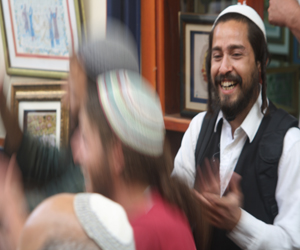Klezmer Trends And Influences
Fiddler Ruby Harris was one of the original performers of The Diapora Yeshiva Band; a two-time consecutive winner of the Israel Chassidic Song Festival and one of the first modern Klezmer bands. Harris has jammed with the late great Shlomo Carlebach, Piamenta, and The Moshav Band. In addition, Ruby was voted Entertainer of the Year by Wild Chicago and won the appellation of Star at the Telluride Blues & Brews Festival. The fiddler plays with Fruteland Jackson at the annual Chicago Blues Festival. Ruby has been an integral part of the Klezmer music scene's renaissance and has performed with the Klezmer Conservatory Band, Andy Statman, The Klezmatics, Jazmer, The Maxwell Street Klezmer Band, and Soulfarm. Ruby consented to an interview with http://www.safed.co.il/ on the subject of Klezmer.
Scratchy 78s
Q: Klezmer has undergone many changes through the years, from fiddle to clarinet and back to fiddle again, for instance. What do you see as the coming trend for this genre?
A: Same pattern: find the latest trends, today even Rap, heavy metal, and reggae, and throw in some klezmer and vice versa. We've been throwing in bluegrass, Santana and Doors for years. Still, yet, there are always purists who stick to the scratchy old 78s, which we all love, of course.
Q: Do you think Klezmer is here to stay, or do you see the current popularity of this music as a trend that will fade and reemerge according to popular whim?
A: It will remain, like many of the other styles that are randomly called for at weddings, such as "Motown", reggae, country, Celtic, blues, Disco, and Klezmer.
Q: How strong an influence does Roma or gypsy music and culture have on Klezmer music in general, and on your own playing in particular?
A: I've been playing Gypsy music forever. It's a major family of music in the general Klezmer family. Lots of good fiddle music.
The Foxtrot
Q: Klezmer and jazz seem to complement each other and even crossover at times. How do you explain the connection between the two styles?
A: Today, as in the early 20th century, many jazz musicians make lots of extra money playing bar mitzvahs and weddings, plus some of the early clarinet or trumpet players got their start playing Jewish music, such as Benny Goodman, Max Kaminsky and Ziggy Elman. Even Charlie Parker and Red Rodney played bar mitzvahs. Jews like to keep up with the trends, so after 20 minutes of old style Jewish music, the bands were prodded by the balabus (the boss who hired them) or the crowd, or even a cute girl, to swing or jazz it up so they could dance the latest Peabody number, or foxtrot, or the Lindy Hop, or nowadays, the Twist or the Pony.

